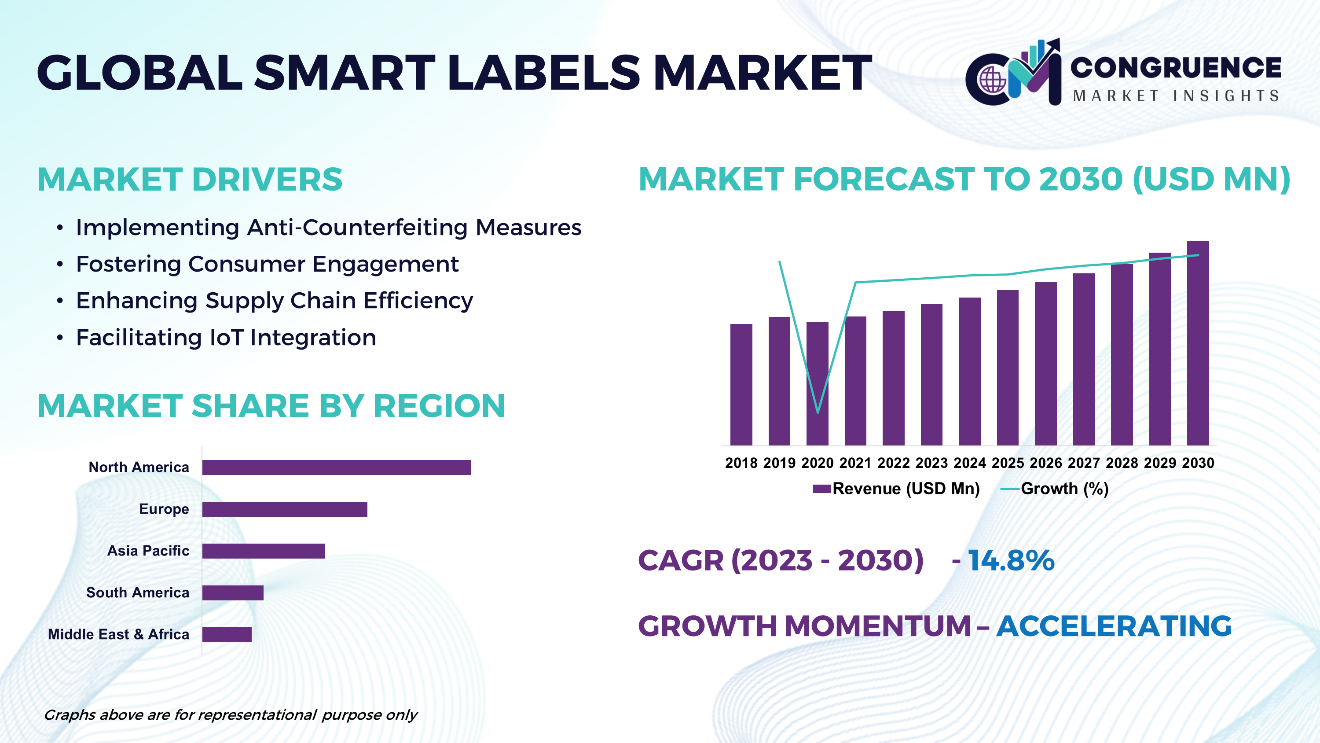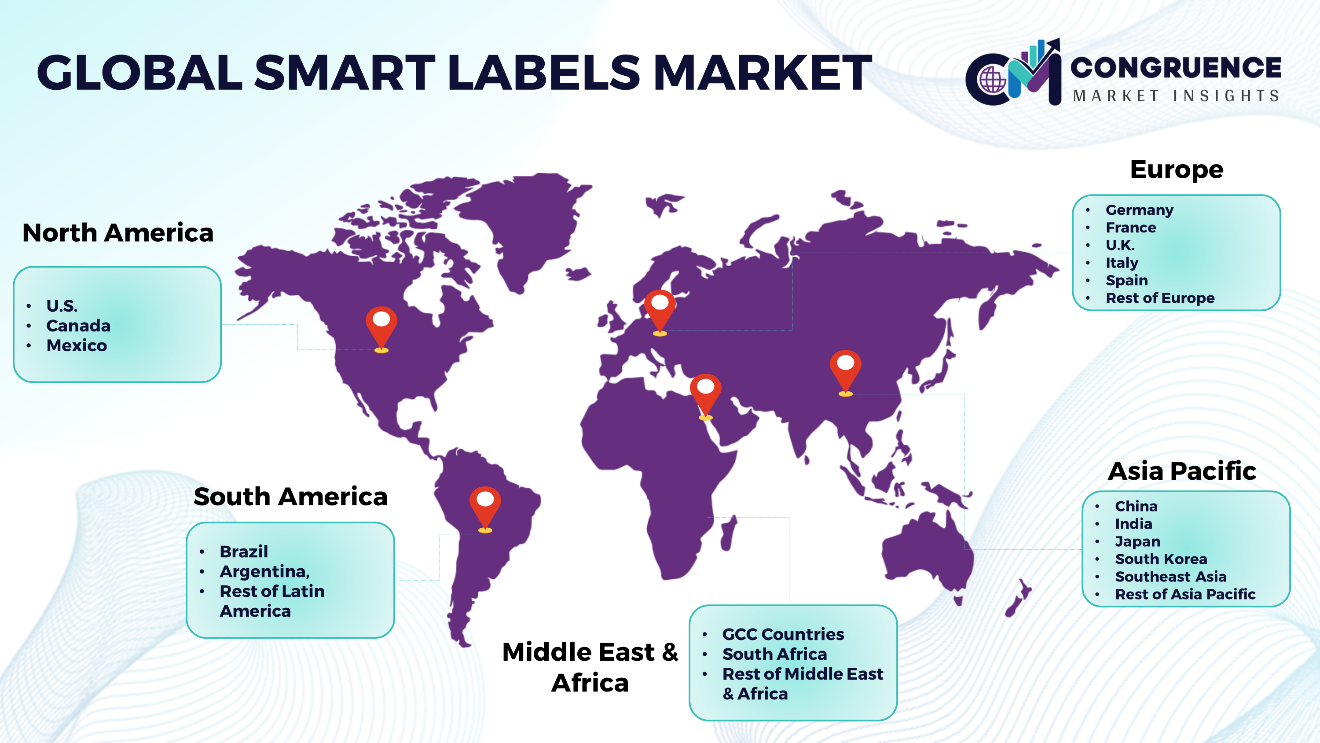Reports
The Smart Label market has experienced substantial growth, driven by industries embracing advanced labeling solutions. These labels, incorporating technologies such as RFID and NFC, have transformed tracking, authentication, and data access across various sectors. Technological advancements in smart labels involve the integration of IoT, enabling real-time data monitoring and improving supply chain visibility. The market landscape reflects a growing demand for effective inventory management, anti-counterfeiting measures, and enhanced consumer interaction. With applications spanning retail, healthcare, logistics, and more, smart labels cater to diverse industry needs. The market's strength lies in its ability to adapt to emerging technologies, fostering innovation to meet evolving consumer and industry demands. As smart labels continue to progress, their integral role in facilitating connectivity and automation positions them as essential components in the contemporary era of intelligent labeling solutions. The Global Smart Label Market is expected to expand at a CAGR of 14.8% between 2023 and 2030.

Smart Label Market Major Driving Forces
Implementing Anti-Counterfeiting Measures: Growing concerns about counterfeit products drive industries to deploy smart labels featuring authentication features. These labels aid in validating product authenticity, mitigating risks associated with counterfeit goods.
Fostering Consumer Engagement: Smart labels empower interactive and immersive consumer experiences through technologies like NFC. This amplifies consumer interaction with products, delivering comprehensive information, promotions, and other pertinent content.
Enhancing Supply Chain Efficiency: The need for improved visibility and efficiency in supply chains propels the adoption of smart labels, facilitating real-time tracking, monitoring, and management of goods in transit. This leads to optimized logistics and more streamlined operational processes.
Facilitating IoT Integration: Integrating smart labels with the Internet of Things (IoT) ensures seamless connectivity, enabling real-time data monitoring and communication. This connectivity elevates overall operational efficiency and promotes data-driven decision-making.
Smart Label Market Key Opportunities
Integration with Emerging Technologies: Exploring synergies with emerging technologies like augmented reality (AR) and blockchain can enhance the capabilities of smart labels. Integration with these technologies can provide additional layers of functionality, security, and transparency.
Focus on Sustainable Labeling: With increasing environmental consciousness, there is an opportunity to develop smart labels that adhere to sustainable practices. Eco-friendly materials, recyclability, and reduced environmental impact are key aspects that can be explored.
Innovations in Printing Technologies: Advancements in printing technologies, such as digital printing and flexible electronics, offer opportunities to enhance the manufacturing process of smart labels. This can lead to more cost-effective and versatile solutions.
Smart Label Market Key Trends
· The widespread adoption of Radio-Frequency Identification (RFID) technology is driving improvements in asset tracking, inventory management, and supply chain visibility through smart labels.
· Smart labels are increasingly being fused with the Internet of Things (IoT) to facilitate real-time data monitoring, enhance connectivity, and support data-driven decision-making across diverse industries.
· There is a growing focus on sustainable practices within the market, prompting smart label manufacturers to explore eco-friendly materials, recyclability, and reduced environmental impact.
· Innovations in printing technologies, such as digital printing and flexible electronics, are influencing the manufacturing processes of smart labels, offering cost-effective and versatile solutions.
· Utilizing the data generated by smart labels for real-time analytics is becoming increasingly prevalent. Businesses are exploring analytics tools and services that provide actionable insights based on smart label data.
· The continual growth of e-commerce is influencing the smart label market, with a focus on providing solutions that enhance the efficiency of online retail operations, including improved inventory management and order fulfillment.

Market Competition Landscape
The Smart Label market is marked by vigorous competition among industry leaders, all emphasizing technological innovation, customization, and integration with emerging technologies. The influx of new entrants and emerging players fuels market growth as they explore advancements in materials science and sustainable labeling solutions. This competitive environment is shaped by a collective emphasis on supply chain efficiency, anti-counterfeiting measures, and improved consumer engagement. These dynamics highlight a dynamic market propelled by diverse applications and evolving industry demands.
Key players in the global Smart Label market implement various organic and inorganic strategies to strengthen and improve their market positioning. Prominent players in the market include:
· Reelables
· CCL Industries
· Avery Dennison Corporation
· SATO Holdings Corporation
· Zebra Technologies Corp.
· Invengo Information Technology Co., Ltd.
· Stallion Group
· Impinj, Inc.
· Smart Label Solutions
· SAG Securitag Assembly Group Co., Ltd.
· Mühlbauer Group
· Confidex Ltd.
· ELCOFLEX
|
Report Attribute/Metric |
Details |
|
Base Year |
2022 |
|
Forecast Period |
2023 – 2030 |
|
Historical Data |
2018 to 2022 |
|
Forecast Unit |
Value (US$ Mn) |
|
Key Report Deliverable |
Revenue Forecast, Growth Trends, Market Dynamics, Segmental Overview, Regional and Country-wise Analysis, Competition Landscape |
|
Segments Covered |
· By Label Technology (RFID (Radio-Frequency Identification), NFC (Near Field Communication), and Electronic Shelf Labels (ESL)) · By Printing Technology (Digital Printing, and Flexographic Printing) · By Application (Inventory Management, Security and Authentication, Smart Packaging, Asset Tracking, and Others) · By End Use Industry (Fashion and Textile, E-Commerce and Retail, Healthcare and Pharmaceutical, Logistics and Transportation, and Others) |
|
Geographies Covered |
North America: U.S., Canada and Mexico Europe: Germany, France, U.K., Italy, Spain, and Rest of Europe Asia Pacific: China, India, Japan, South Korea, Southeast Asia, and Rest of Asia Pacific South America: Brazil, Argentina, and Rest of Latin America Middle East & Africa: GCC Countries, South Africa, and Rest of Middle East & Africa |
|
Key Players Analyzed |
Reelables, CCL Industries, Avery Dennison Corporation, SATO Holdings Corporation, Zebra Technologies Corp., Invengo Information Technology Co., Ltd., Stallion Group, Impinj, Inc., Smart Label Solutions, SAG Securitag Assembly Group Co., Ltd., Mühlbauer Group, Confidex Ltd., ELCOFLEX |
|
Customization & Pricing |
Available on Request (10% Customization is Free) |
